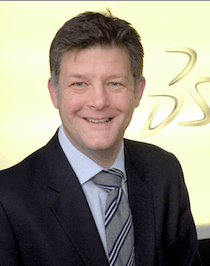Investment and innovation in the UK’s automotive industry is bringing social benefits and productivity gains

Stephen Chadwick, Dassault Systèmes
Recently BBC News quoted former VW group president and now head of the Coventry and Warwickshire Local Enterprise Partnership, Jonathan Browning. He cited foreign investment as key to the region’s spectacular recovery that has lead to the lowest unemployment for 30 years and the region becoming the ‘brains’ of the UK vehicle industry, writes Stephen Chadwick, the managing director for EuroNorth at Dassault Systèmes.
Browning calls this generation of national and international growth the JLR effect and explained: “Jaguar Land Rover has doubled in size and its growth has been a catalyst for the local automotive supply chain.” The trickle down effect is seen in improved infrastructure, thriving local suppliers and increased social positivity.” The new £100m Advanced Propulsion Centre and the £92m National Automation Innovation Campus at Warwick University will certainly enhance the situation.In the UK transportation, mobility and the companies behind it are changing with new technologies and usage models. By 2030 a £50bn boost to the UK economy from autonomous and connected vehicles is predicted by The Society for Motor Manufacturers. This summer Google’s driverless cars passed the one million miles mark. That equates to around 80 years of human driving during which there were 11 minor accidents. All were caused human error and caused no injuries. Compare that with the annual 1.2 million crash fatalities and 50 million injuries that the world currently suffers and autonomous vehicles look increasingly attractive.
The vehicle industry is buzzing with innovations. August saw the £2bn acquisition of Nokia’s ‘Here’ vehicle location mapping business by a group of automotive companies. This will lead to “highly automated driving” according to Nokia chief executive, Rajeev Suri.
David Bailey, professor of industry at Aston Business School in Birmingham was quoted in the Guardian saying, “There are more and more autonomous features being developed all the time and the technology is transforming the industry.”
The transportation and mobility industry is also innovating around changing ownership models. People are unlikely to ever stop wanting their own cars but these days there are some good reasons not to have one. Transport ownership especially in cities is becoming more expensive and less desirable as public and shared transport options evolve in line with congestion charging and fewer parking spaces. It is now possible in many cities to use pedal bikes, electric and other internet bookable vehicles almost as though they are self-owned. They offer convenience and flexibility without ownership responsibility or fixed costs. Prohibitive insurance prices for young motorists add to the attraction of non-ownership.
A spur to innovation from new companies entering the market is the advent of practicable electric vehicles. Companies that have formerly been producers of consumer electronics see mobility as a huge opportunity.
Another major change is the cross-discipline movement between city planners, builders, energy management and transportation professionals. The coming together of these formerly diverse disciplines holds new challenges and risks for the mobility industry which has to re-define its value capture models and perhaps its entire method of operation. To manage this change, traditional static and hierarchical business structures are being replaced by new dynamic collaboration models – a move that needs to accelerate.
Mobility is often an emotional and social experience that varies widely across the world. To capture market share, providers must appeal to those emotions and communities with truly innovative solutions. They have to cross boundaries to discover new ideas, and then turn them into tomorrow’s profitable products and services that deliver widely felt economic and social benefits.
It is certain that tomorrow’s transportation will be radically different from today’s. I am fascinated by these developments and glad to be in partnerships that are taking this journey to the future.
